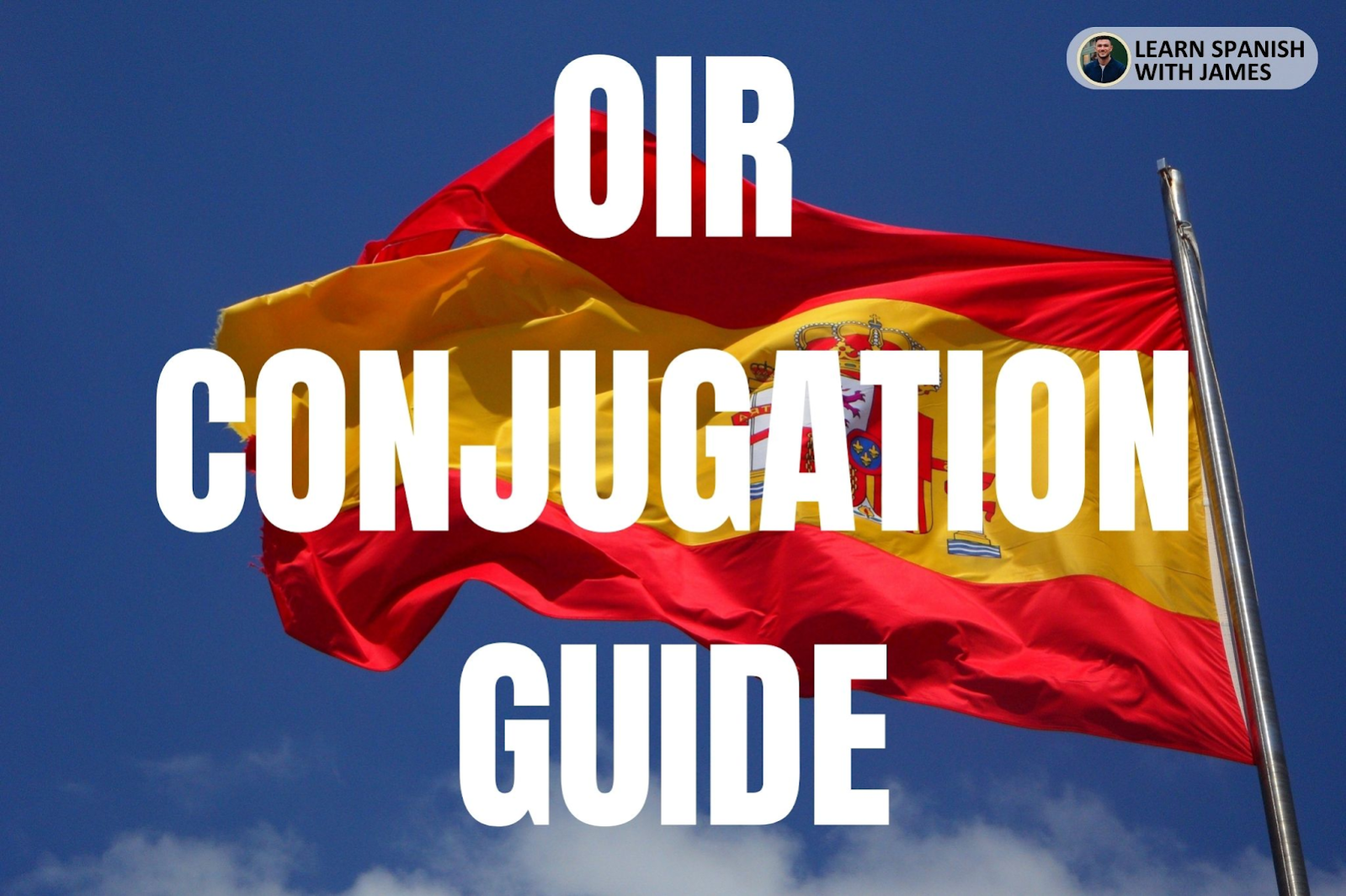Oír Conjugation Chart & Full Tense Guide

The Spanish verb “oír” means “to hear”. Unlike its counterpart “escuchar,” which means “to listen,” “oír” is more passive in nature.
As an irregular verb, the Spanish verb “oir” can be challenging for learners. However, mastering its conjugation is important to convey the idea of hearing in all everyday interactions in both Spain and Latin America.
I’m James, from Learn Spanish With James, and in this guide, we’ll cover the conjugation of “oír” across various tenses, including compound tenses, as well as the imperative and subjunctive tenses.
We’ll also explore its usage with example sentences and English translations.
The Present Tense
Pronouns Pronombres Conjugation
I yo oigo
you tú oyes
he,she,it, you(formal) él,ella,usted oye
we nosotros,nosotras oímos
you pl. vosotros, vosotras oís
they, you pl. (formal) ellos,ellas,ustedes oyen
When We Use the Present Tense
The present tense is used to describe actions that are currently happening, habitual actions, general truths, or future actions.
You should know by now that in Spanish, conjugating verbs means changing their endings to match the subject performing the action.
Notice that in the first person singular we have a -g before the ending (”yo oigo”).
Examples of the Spanish Verb Oír in the Present Tense
- Yo oigo los pájaros cantando. (I hear the birds singing.)
- Tú oyes música en la radio. (You hear music on the radio.)
- Él/ella oye el sonido del mar. (He/she hears the sound of the sea.)
- Nosotros oímos la conferencia con atención. (We hear the lecture attentively.)
- Vosotros oís a los niños jugando afuera. (You all hear the children playing outside.)
- Ellos/ellas oyen una conversación interesante. (They hear an interesting conversation.)
The Preterite Tense
Pronouns Pronombres Conjugation
I yo oí
you tú oíste
he, she. it, you (formal) él, ella, usted oyó
we nosotros, nosotras oímos
you (plural) vosotros, vosotras oísteis
they, you (pl. formal) ellos, ellas, ustedes oyeron
When We Use the Preterite Tense
Due to its significance, the preterite tense is likely the second tense you’ll learn when you start to learn Spanish.
We use it to describe actions that were completed in the past at a specific point in time. For example, “I heard a loud bang”.
Here are also examples of the “oír” conjugations for this past tense in context.
Examples of the Preterite Tense Oír Conjugations
- Yo oí la noticia anoche. (I heard the news last night.)
- Tú oíste un ruido extraño en la calle. (You heard a strange noise in the street.)
- Él/ella oyó la música desde su habitación. (He/she heard the music from his/her room.)
- Nosotros oímos el concierto el sábado pasado. (We heard the concert last Saturday.)
- Vosotros oísteis los aplausos al final de la obra. (You all heard the applause at the end of the play.)
- Ellos/ellas oyeron el mensaje y respondieron rápidamente. (They heard the message and responded quickly.)
The Imperfect Tense
Pronouns Pronombres Conjugation
I yo oía
you tú oías
he, she, it, you (formal) él, ella, usted oía
we nosotros, nosotras oíamos
you (plural) vosotros, vosotras oíais
they, you(pl. formal) ellos, ellas, ustedes oían
When We Use the Imperfect Tense
Unlike the preterite tense we’ve just covered, the imperfect tense is used to describe ongoing or habitual actions in the past, to describe states of being or conditions, or to provide background information.
An example is “I was hearing” or “I used to hear”, but not “I heard”.
Here are also examples of the “oír” conjugations for this past tense in context.
Examples of Oír in the Imperfect Tense
- Yo oía el sonido de la lluvia todas las noches. (I used to hear the sound of the rain every night.)
- Tú oías el ruido de los coches en la calle. (You used to hear the noise of the cars on the street.)
- Él/ella oía música clásica mientras estudiaba. (He/she used to listen to classical music while studying.)
- Nosotros oíamos las historias de nuestros abuelos con atención. (We used to hear our grandparents’ stories attentively.)
- Vosotros oíais los pájaros cantando en el jardín. (You all used to hear the birds singing in the garden.)
- Ellos/ellas oían voces en la oscuridad. (They used to hear voices in the darkness.)
The Future Tense
Pronouns Pronombres Conjugation
I yo oiré
you tú oirás
he,she,it, you(formal) él,ella,usted oirá
we nosotros,nosotras oiremos
you pl. vosotros, vosotras oiréis
they, you pl. (formal) ellos,ellas,ustedes oirán
When We Use the Future Tense
We use the future tense in Spanish when we want to describe actions that will happen in the future.
For example, “Yo oiré” means “I will listen”. It should be said, however, that this is not a common tense with the verb “oir”.
In Spanish, the future tense is formed by adding specific endings to the infinitive of the verb, which makes it quite easy to learn.
Examples of Oír in the Future Tense
- Yo oiré la conferencia completa mañana. (I will hear the entire lecture tomorrow.)
- Tú oirás las noticias en la radio por la mañana. (You will hear the news on the radio in the morning.)
- Él/ella oirá el concierto el próximo viernes. (He/she will hear the concert next Friday.)
- Nosotros oiremos el sonido de las olas en la playa. (We will hear the sound of the waves at the beach.)
- Vosotros oiréis el canto de los pájaros al amanecer. (You all will hear the birdsong at dawn.)
- Ellos/ellas oirán el ruido de la fiesta desde lejos. (They will hear the noise of the party from afar.)
The Conditional Tense
Pronouns Pronombres Conjugation
I yo oiría
you tú oirías
he,she,it, you(formal) él,ella,usted oiría
we nosotros,nosotras oiríamos
you pl. vosotros, vosotras oiríais
they, you pl. (formal) ellos,ellas,ustedes oirían
When We Use the Conditional Tense
The official definition of the conditional tense is that we use it to express hypothetical situations, desires, or polite requests.
All you really need to remember for now is that it means “would” in the future tense.
Just like the future tense discussed above, the conditional tense in Spanish is formed by adding specific endings to the infinitive of the verb.
I have provided example sentences below, showing how to use “oír” in the conditional tense with the imperfect subjunctive.
Examples of Oír in the Conditional Tense
- Yo oiría mejor si me pusiera los audífonos. (I would hear better if I put on my headphones.)
- Tú oirías la música si no fuera tan fuerte. (You would hear the music if it weren’t so loud.)
- Él/ella oiría la conversación si estuviera más cerca. (He/she would hear the conversation if he/she were closer.)
- Nosotros oiríamos mejor si no hubiera tanto ruido. (We would hear better if there weren’t so much noise.)
- Vosotros oiríais el mensaje si prestaseis más atención. (You all would hear the message if you paid more attention.)
- Ellos/ellas oirían el discurso si no hablaran tan bajo. (They would hear the speech if they didn’t speak so softly.)
The Perfect Tense
Pronouns Pronombres Auxiliary verb ‘haber’ Past Participle
I yo he oído
you tú has oído
he,she,it, you(formal) él,ella,usted ha oído
we nosotros,nosotras hemos oído
you pl. vosotros, vosotras habéis oído
they, you pl. (formal) ellos,ellas,ustedes han oído
When We Use the Perfect Tense
The perfect tense is used to describe actions that have been completed in the past immediately before another past action.
To conjugate “oír” in the perfect tense, use the auxiliary verb haber in the present tense followed by the past participle of the main verb.
This is a sentence structure you will need to become familiar with, as we need to conjugate “haber” to form the perfect tense, the pluperfect tense, the future perfect tense, and the conditional perfect tense.
Examples of Oír in the Preterite Perfect Tense
- Yo he oído ese chiste antes. (I have heard that joke before.)
- Tú has oído hablar de eso. (You have heard about that.)
- Él/ella ha oído la noticia recientemente. (He/she has heard the news recently.)
- Nosotros hemos oído rumores al respecto. (We have heard rumors about it.)
- Vosotros habéis oído la canción en la radio. (You all have heard the song on the radio.)
- Ellos/ellas han oído las opiniones de los expertos. (They have heard the opinions of the experts.)
The Pluperfect Tense
Pronouns Pronombres Auxiliary verb ‘haber’ Past Participle
I yo había oído
you tú habías oído
he,she,it, you(formal) él,ella,usted había oído
we nosotros,nosotras habíamos oído
you pl. vosotros, vosotras habíais oído
they, you pl. (formal) ellos,ellas,ustedes habían oído
When We Use the Pluperfect Tense
The pluperfect tense is used to describe actions that had been completed before another past action.
The translation is “had heard”.
If you want to conjugate “oír” in the pluperfect tense, you need to use the imperfect tense of the auxiliary “haber”, followed by the past participle “oído”.
Examples of this are below.
Examples of Oír in the Pluperfect Tense
- Yo había oído esa historia muchas veces. (I had heard that story many times.)
- Tú habías oído hablar de él anteriormente. (You had heard about him previously.)
- Él/ella había oído rumores sobre el proyecto. (He/she had heard rumors about the project.)
- Nosotros habíamos oído la canción en otro concierto. (We had heard the song at another concert.)
- Vosotros habíais oído las noticias en la televisión. (You all had heard the news on TV.)
- Ellos/ellas habían oído los argumentos del debate. (They had heard the arguments of the debate.)
The Future Perfect Tense
Pronouns Pronombres Auxiliary verb ‘haber’ Past Participle
I yo habré oído
you tú habrás oído
he,she,it, you(formal) él,ella,usted habrá oído
we nosotros,nosotras habremos oído
you pl. vosotros, vosotras habréis oído
they, you pl. (formal) ellos,ellas,ustedes habrán oído
When We Use the Future Perfect Tense
The future perfect tense describes actions that will have been completed by a certain point in the future.
In order to conjugate “oír” in the future tense, take the auxiliary verb “haber” followed by the past participle of the main verb.
Examples of Oír in the Future Perfect Tense
- Yo habré oído todas las pistas antes del concierto. (I will have heard all the tracks before the concert.)
- Tú habrás oído las noticias para entonces. (You will have heard the news by then.)
- Él/ella habrá oído la explicación antes de la reunión. (He/she will have heard the explanation before the meeting.)
- Nosotros habremos oído las opiniones de todos. (We will have heard everyone’s opinions.)
- Vosotros habréis oído el resultado del examen. (You all will have heard the result of the exam.)
- Ellos/ellas habrán oído el sonido de los cohetes en la noche. (They will have heard the sound of the fireworks at night.)
The Conditional Perfect Tense
Pronouns Pronombres Auxiliary verb ‘haber’ Past Participle
I yo habría oído
you tú habrías oído
he,she,it, you(formal) él,ella,usted habría oído
we nosotros,nosotras habríamos oído
you pl. vosotros, vosotras habríais oído
they, you pl. (formal) ellos,ellas,ustedes habrían oído
When We Use the Conditional Perfect Tense
The conditional perfect tense is used to describe actions that would have been completed under certain conditions in the past.
When you want to conjugate “oír” in the conditional perfect, use the conditional tense of the auxiliary verb haber “followed” by the past participle of the main verb.
Examples of “Oír” in the Conditional Perfect Tense
- Yo habría oído la conferencia si hubiera tenido tiempo. (I would have heard the lecture if I had had time.)
- Tú habrías oído la noticia si hubieras estado atento. (You would have heard the news if you had been paying attention.)
- Él/ella habría oído la música si no hubiera estado ocupado. (He/she would have heard the music if he/she hadn’t been busy.)
- Nosotros habríamos oído el discurso si hubiera habido menos interrupciones. (We would have heard the speech if there had been fewer interruptions.)
- Vosotros habríais oído el mensaje si hubierais estado presentes. (You all would have heard the message if you had been present.)
- Ellos/ellas habrían oído la conversación si hubieran estado cerca. (They would have heard the conversation if they had been nearby.)
The Present Subjunctive
Pronouns Pronombres Conjugation
I yo oiga
you tú oigas
he,she,it, you(formal) él,ella,usted oiga
we nosotros,nosotras oigamos
you pl. vosotros, vosotras oigáis
they, you pl. (formal) ellos,ellas,ustedes oigan
When We Use the Present Subjunctive
The subjunctive is used to express desires, doubts, wishes, or hypothetical situations.
It often follows expressions of influence, emotion, doubt, or denial.
Examples of Oír in the Present Subjunctive
- Espero que yo oiga bien durante la conferencia. (I hope that I hear well during the lecture.)
- No creo que tú oigas todo lo que dicen. (I don’t think you hear everything they say.)
- Es posible que él/ella oiga los argumentos de ambos lados. (It’s possible that he/she hears arguments from both sides.)
- Dudo que nosotros oigamos algo desde aquí. (I doubt that we hear anything from here.)
- Ojalá que vosotros oigáis lo que necesitáis saber. (Hopefully, you all hear what you need to know.)
- No es seguro que ellos/ellas/ustedes oigan la llamada de auxilio. (It’s not certain that they hear the distress call.)
The Imperfect Subjunctive
Pronouns Pronombres Conjugation
I yo oyera, oyese
you tú oyeras, oyeses
he,she,it, you(formal) él,ella,usted oyera, oyese
we nosotros,nosotras oyéramos, oyésemos
you pl. vosotros, vosotras oyerais, oyeseis
they, you pl. (formal) ellos,ellas,ustedes oyeran, oyesen
When We Use the Imperfect Subjunctive
The imperfect subjunctive is used to express doubts, wishes, or hypothetical situations in the past.
It is often used in subordinate clauses after expressions of influence, emotion, doubt, or denial.
Examples of Oír in the Imperfect Subjunctive
- Quería que yo oyera su versión de los hechos. (He wanted me to hear his side of the story.)
- Preferías que tú oyeras la noticia de mí. (You preferred to hear the news from me.)
- Dudaba que él/ella oyera las voces en la oscuridad. (He/she doubted that he/she heard the voices in the darkness.)
- Esperábamos que nosotros oyéramos bien el audio. (We hoped that we heard the audio clearly.)
- Recomendaban que vosotros oyerais las opiniones de todos. (They recommended that you all hear everyone’s opinions.)
- Temían que ellos/ellas/ ustedes no oyeron las instrucciones correctamente. (They feared that they didn’t hear the instructions correctly.)
Affirmative Imperative
Pronouns Pronombres Conjugation
you tú ¡oye!
he,she,it, you(formal) él,ella,usted ¡oiga!
we nosotros,nosotras ¡oigamos!
you pl. vosotros, vosotras ¡oíd!
they, you pl. (formal) ellos,ellas,ustedes ¡oigan!
When We Use The Affirmative Imperative
The affirmative imperative is used to give commands or orders in a direct and affirmative manner.
With the verb ”oir”, it’s used when you want someone to hear something.
Affirmative Imperative
- Oye el sonido del mar. (Listen to the sound of the sea.) [tu]
- Oiga la música con atención. (Listen to the music attentively.) [usted]
- Oigamos el concierto juntos. (Let’s listen to the concert together.) [nosotros]
- Oíd el canto de los pájaros. (Listen to the birdsong.) [vosotros]
- Oigan la explicación detenidamente. (Listen to the explanation carefully.) [ellos/ellas]
Negative Imperative
Pronouns Pronombres Conjugation
you tú ¡no oigas!
he,she,it, you(formal) él,ella,usted ¡no oiga!
we nosotros,nosotras ¡no oigamos!
you pl. vosotros, vosotras ¡no oigáis!
they, you pl. (formal) ellos,ellas,ustedes ¡no oigan!
When We Use The Negative Imperative
The negative imperative is used to give commands or orders in a direct and negative manner.
We use it when we want someone not to do something.
The Negative Imperative
- No oigas la música tan alta. (Don’t listen to the music so loudly.) [tu]
- No oiga usted los rumores. (Don’t listen to the rumors.) [usted]
- No oigamos los comentarios negativos. (Let’s not listen to the negative comments.) [nosotros]
- No oigáis las críticas destructivas. (Don’t listen to the destructive criticisms.) [vosotros]
- No oigan las voces en la oscuridad. (Don’t listen to the voices in the darkness.) [ellos/ellas]
Online Spanish Courses & Grammar Courses
For a full list of Beginner, Intermediate and Advanced Courses, check out this full list of online Spanish courses.
I put this list together myself, and it comprises a mixture of courses that offer Spanish grammar practice for all levels, conversational practice, listening and writing exercises in Spanish, free Spanish courses, and a whole lot more.
The fastest way to learn Spanish is to test a mixture of Spanish resources and choose the course that coincides most with your learning style.
In addition to online Spanish courses, on this site you will find access to my own podcast, Learn Spanish With James, Spanish apps, Spanish YouTube channels, and both online and physical Spanish language schools.

About James – Or Should that be Santiago?
My name is James. I am a Brit with a love for the Spanish language. I have lived in Spain, Argentina, and Costa Rica, and I have been teaching Spanish for over a decade. This site will show you how to master the elements of Spanish grammar that often dishearten learners. I hope you enjoy the site and find it useful.
If you are interested in taking your Spanish to the next level, check out the Courses section for a full list of the Spanish courses I suggest. All reviews are based on my personal opinions.







